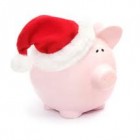 Have you worked out a plan for Christmas? Written up a Christmas Budget? Really I should have started doing this a month ago but I've been a bit lax this year. I made up a Christmas budget last year, and found it an enourmous help. Not to mention a money saver. It's like anything else. You write up a list and stick to it, and you find you spend a third less than you'd normally spend. For more money saving tips for Christmas, check out Tamsin's post here.
Have you worked out a plan for Christmas? Written up a Christmas Budget? Really I should have started doing this a month ago but I've been a bit lax this year. I made up a Christmas budget last year, and found it an enourmous help. Not to mention a money saver. It's like anything else. You write up a list and stick to it, and you find you spend a third less than you'd normally spend. For more money saving tips for Christmas, check out Tamsin's post here.
However, in researching this post I found that it is just as important to at least work out a rough schedule for Christmas too. It isn't just about making more effecient use of time, although that's important, but also about not forgetting anything thus resulting in a last minute dash that costs you three times as much.
So, from what I could find, there's three aspects to spending less and getting more at Christmas time. Planning: what do you need? Budgeting: how much do you have to spend? Timetable: what do you need to do?
I don't mind doing all this, if it helps me have an enjoyable Christmas without breaking the overdraft. It just seems so mindnumbingly boring! Surely someoen, somewhere has already done all this and I can just learn from their research? Well, yes! And so can you. It is what the Internet does the best. Here's what I found, online.
Budgets & Planning
 Last year, which was the first time I had done this (shocking I know! But pre-redundandancy, work was so busy at that time of the year I simply never had the time to do any sort of planning), I just wrote out a plan for Christmas dinner and presents for the kids.
Last year, which was the first time I had done this (shocking I know! But pre-redundandancy, work was so busy at that time of the year I simply never had the time to do any sort of planning), I just wrote out a plan for Christmas dinner and presents for the kids.
How naive and simple that seems now! If you're going to do this, do it properly. Factor in decorations, wrapping paper, cards, sundries like extra tin foil, and all the regular stuff you'll be using a lot more of over the holidays like sandwich loaf (with everyone off work and eating at home).
On the US blog Simple Mum you can download a simple, single sheet budget/planning form in PDF format. This is designed for parents, so it includes stuff you might not think of like craft supplies (so you can save money on decorations by getting the kids to make them but don't forget to factor in the expenses involved), and ingredients for Christmas cookies.
If like me you love nothing better than a good spreadsheet, try this one. Created by Melbourne mum Andrea, you can download it from her blog Planning With Kids. You'll need either Excel or a programme that can open Excel spreadsheets. One idea of hers that I will definitely be nicking is to include the previous year's worksheets in the same spreadsheet. Handy for quick reference and undoubtedly there will be a lot that doesn't change.
 However you decide to do it, one important feature for your worksheet or planning list will be the column for costs. Make sure you list everything. Candles for the Advent Candle? Fake holly for making a wreath for the front door? A nail for hanging up the wreath? I've learnt the hard way over the years that it is the pennies that you spend that soon add up.
However you decide to do it, one important feature for your worksheet or planning list will be the column for costs. Make sure you list everything. Candles for the Advent Candle? Fake holly for making a wreath for the front door? A nail for hanging up the wreath? I've learnt the hard way over the years that it is the pennies that you spend that soon add up.
Which ties in with the third part of our Frugal Christmas Masterplan. Working out a timetable.
Schedule
Underpinning your budget and planning sheet, and tying both together, will be a good timetable. I don't say this from my own experience because I'm still such a novice at this sort of thing. But according to the experiences of every good frugal blogger on the internet, it seems to be quite crucial.
I guess that it is all well and good telling you to factor in everything for your Christmas budget, but if you don't work out exactly what you're doing or are likely to be doing over Chirstmas, you're more inclined to forget something.
It seems that there are two aspects to any Christmas schedule. First, write down all the events you need to plan for. Factor in seasonal events like advent calendars ready for December 1st, nativity plays, school Christmas productions, panto, as well as the obvious stuff like Christmas dinner, stocking fillers, decorations.
 Then give yourself some deadlines. You could, for example, plan to have bought all the non-perishables by the end of October like nuts, napkins, extra/disposable cutlery, table cloths. Sainsburys and Tesco, and other stores, always have huge toy sales in October or early November. Have a look here on PlayPennies - when did Toys R Us have its big sale last year? Chances are good it will be around the same time every year. They've got some great tips on budgeting for food at Christmas over at Netmum's, and I particularly like their advice on making use of the freezer.
Then give yourself some deadlines. You could, for example, plan to have bought all the non-perishables by the end of October like nuts, napkins, extra/disposable cutlery, table cloths. Sainsburys and Tesco, and other stores, always have huge toy sales in October or early November. Have a look here on PlayPennies - when did Toys R Us have its big sale last year? Chances are good it will be around the same time every year. They've got some great tips on budgeting for food at Christmas over at Netmum's, and I particularly like their advice on making use of the freezer.
I know that there's a lot to be said against freezing meat, particularly red meat. It degrades the structure of the meat fibres so it isn't quite the same as fresh meat. Personally though I've never noticed such a big difference. Sure it is nice to push out the boat and get something really that little bit more special for Christmas. But at the end of the day, if you're on a tight budget, you've got to think about what you're going to spend and where. Last year, I bought a leg of lamb, and a huge lump of beef to roast, in advance and kept it in the freezer until shortly before Christmas (don't forget to factor in defrosting time). And no-one noticed that my pot-roast wasn't quite as good as the previous years'.
Got a top tip?
 Here's another thing I learned last year. I went to the local Sainsburys as soon as it opened on Christmas eve, to buy fish for Christmas dinner. I was trying not to look at the last remaining plump and succulent sea bass, as sadly at £15 it was WAY out of my budget, when the fishmonger said "How about the sea bass? It is the last one so I'm able to sell it for half price". Bargain!
Here's another thing I learned last year. I went to the local Sainsburys as soon as it opened on Christmas eve, to buy fish for Christmas dinner. I was trying not to look at the last remaining plump and succulent sea bass, as sadly at £15 it was WAY out of my budget, when the fishmonger said "How about the sea bass? It is the last one so I'm able to sell it for half price". Bargain!
So please, if there's any little secrets like that you've learnt over the years, please please do share here. I really do need all the help I can get!

















Comments